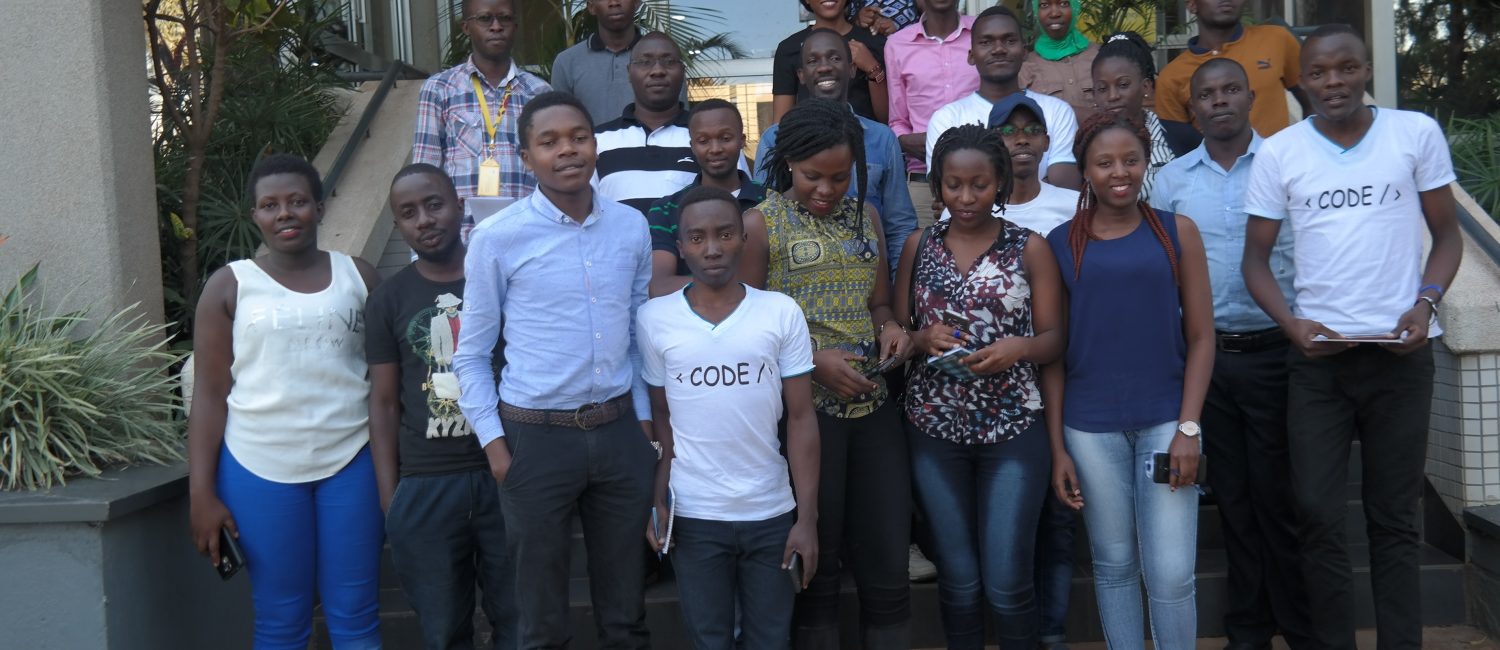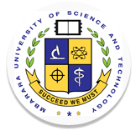
Bachelors in Computer Science
The BSc. CS Degree programme
The Bachelor of Science in Computer Science degree is a three year programme with each year having two semesters. It will provide graduates with durable knowledge needed to become leaders in the rapidly evolving discipline of Computer Science as well as in other computer-related fields. The programme exposes students to a solid foundation in both Computer Science theory and programming practice, and to prepare each graduate for further advanced study in Computer Science and related fields.
Programme Objectives
The objectives of the Bachelor of Science in Computer Science degree programme are for graduates:
- To have successful careers in the field of computer science
- To have a strong foundation in computing and mathematical theoretical concepts and can apply these concepts to problems requiring computer solutions
- To be effective communicators, team members and leaders that add value to employers and businesses regionally and globally
- To stay current in emerging technologies through training, self-learning and/or graduate studies
- To understand, and be proficient in the use of, system design notations and system design engineering process to develop software systems and solve problems in computer science
- To be engaged in the ethical, legal and social issues faced in their workplace and contribute positively to the community
Upon completion of a Bachelor of Science in Computer Science programme, students will:
- Be competent in theoretical and mathematical foundations of computer science and be able to: – apply fundamental concepts of discrete mathematics such as logic, proofs, set theory, relations, functions, and combinatorics to model computational problems, – demonstrate the application of abstract structures such as graphs, finite state machines, and recurrence relations to the solution of computer science problems, – analyze and evaluate comparative performance of algorithms and data structures appropriate to solving computer science problems, – apply concepts related to data structures such as lists, stacks, queues, arrays, graphs, trees, heaps, and hashing to design and create algorithms.
- Be proficient in one programming language and have a basic knowledge of several others and be able to: – write programs in a procedural programming language. – write efficient solutions to specific problems using an object-oriented programming language, – write programs in a scripting language, – write programs for a mobile based platform.
- Be able to understand the hardware and software architecture of computer systems and be able to: – explain the function and interaction of computer processing units, memories, and input/output devices, – define and explain elements of operating systems such as memory management, process scheduling, synchronization and interaction, and input/output devices, – distinguish computer network elements and understand issues related to computer security
- Demonstrate the ability to participate in professional practices related to software engineering and be able to: – negotiate, clarify, and document user requirements – apply knowledge of fundamental algorithms, programming language concepts, and design patterns to determine an overall design for a software system, – implement a fully specified system, 4 – test a fully specified system, – plan and monitor the progress of software projects to ensure on time delivery of a high quality system.
- Be able to communicate effectively about computer science-related topics and be able to – deliver an audience-sensitive oral technical presentation, – write an audience-sensitive technical document, – contribute effectively on software-based system development teams
- Be able to demonstrate the ability to be responsible practitioners of computer science and understand the social and ethical implications of computing and be able to: – demonstrate ways in which computers pose new ethical questions or pose new versions of standards, moral problems and dilemmas, – recognize and, when appropriate, to resolve ethical problems or dilemmas related to the computing profession.
Modules under BSc.CS
| Course Code | Course Name | LH | TH | PH | CH | CU | |
| Year I: Semester I (7 core courses) | |||||||
| CSC 1101 | Introduction to Computing | 45 | 15 | 15 | 60 | 4 | |
| CSC 1102 | Introduction to ComputerProgramming | 45 | 15 | 15 | 60 | 4 | |
| CSC 1103 | Digital Logic | 30 | 30 | – | 45 | 3 | |
| DVS 1101 | Development Studies I | 30 | – | – | 30 | 2 | |
| BIT 1101 | Communication andWriting Skills | 30 | – | 30 | 45 | 3 | |
| MTH 1101 | Discrete Mathematics | 30 | 30 | – | 45 | 3 | |
| MTH 1102 | Calculus 1 | 30 | 30 | – | 45 | 3 | |
| Total Credit Units | 22 | ||||||
| Year I: Semester II (8 core courses) | |||||||
| CSC 1201 | Systems Analysis and Design | 30 | 30 | – | 45 | 3 | |
| CSC 1202 | Object OrientedProgramming I | 45 | 15 | 15 | 60 | 4 | |
| CSC 1203 | Database ManagementSystems | 45 | 15 | 15 | 60 | 4 | |
| CSC 1204 | Web Technologies | 45 | 15 | 15 | 60 | 4 | |
| MTH 1201 | Calculus II | 45 | 30 | – | 60 | 4 | |
| MTH 1202 | Linear Algebra | 45 | – | – | 45 | 3 | |
| MTH 1203 | Probability and Statistics | 45 | 30 | – | 60 | 4 | |
| DVS 1201 | Development Studies II | 30 | – | – | 30 | 2 | |
| Total Credit Units | 28 | ||||||
| Year II: Semester I (8 core courses) | |||||||
| CSC 2101 | Data Structures | 45 | – | – | 45 | 3 | |
| CSC 2102 | Operating Systems | 45 | 30 | – | 60 | 4 | |
| CSC 2103 | Scripting Languages | 45 | 15 | 15 | 60 | 4 | |
| CSC 2104 | Operations Research | 45 | – | – | 45 | 3 | |
| CSC 2105 | Database Programming | 45 | 15 | 15 | 60 | 4 | |
| CSC 2106 | Object OrientedProgramming II | 45 | 15 | 15 | 60 | 4 | |
| MTH 2101 | Numerical AnalysisComputation | 30 | 30 | – | 45 | 3 | |
| MTH 2102 | Differential Equations | 30 | 30 | – | 45 | 3 | |
| Total Credit Units | 28 | ||||||
| Year II: Semester II (7 core courses) | |||||||
| CSC 2201 | Logic Programming | 30 | – | 30 | 60 | 3 | |
| CSC 2202 | Design and Analysisof Algorithms | 45 | 15 | 15 | 60 | 4 | |
| CSC 2203 | Software Engineering | 45 | – | 30 | 60 | 4 | |
| CSC 2204 | User Interface Designand Development | 45 | 15 | 15 | 60 | 4 | |
| CSC 2205 | Computer Organizationand Architecture | 45 | – | – | 45 | 3 | |
| CSC 2206 | Systems Administration | 45 | 15 | 15 | 60 | 4 | |
| BIT 2204 | Research Methods inComputing | 45 | – | – | 45 | 3 | |
| 2 Optional Courses | |||||||
| CSC 2207 | Computer Graphics | 45 | 15 | 15 | 60 | 4 | |
| CSC 2208 | Modeling and Simulation | 45 | 15 | 15 | 60 | 4 | |
| Total Credit Units | 29 | ||||||
| Recess Semester | |||||||
| CSC 2301 | Industrial Training | – | – | 120 | 60 | 4 | |
| Year III: Semester I (5 core courses) | |||||||
| CSC 3101 | Artificial Intelligence | 30 | 30 | – | 45 | 3 | |
| CSC 3102 | Data Communicationsand Networks | 45 | 15 | 15 | 60 | 4 | |
| CSC 3103 | Automata, Complexityand Computability | 45 | – | – | 45 | 3 | |
| CSC 3104 | Computer and NetworkSecurity | 45 | – | 30 | 60 | 4 | |
| BIT 3105 | Entrepreneurship | 45 | – | – | 45 | 3 | |
| 2 Optional Courses | |||||||
| CSC 3105 | Data Mining | 45 | – | 30 | 60 | 4 | |
| CSC 3106 | Mobile Programming | 45 | – | 30 | 60 | 4 | |
| Total Credit Units | 21 | ||||||
| Year III: Semester II (5 core courses) | |||||||
| CSC 3201 | Distributed Computing | 45 | – | – | 45 | 3 | |
| CSC 3202 | Compiler Construction | 30 | – | 30 | 45 | 4 | |
| CSC 3203 | Emerging Trends inComputer Science | 45 | – | – | 45 | 3 | |
| CSC 3204 | Final Year Research Project | – | – | 120 | 60 | 4 | |
| BIT 3201 | Legal and Ethical Issuesin Computing | 45 | – | – | 45 | 3 | |
| Total Credit Units | 17 | ||||||
BSc. CS Fees Structure
Privately sponsored students shall pay all the required fees to the University as determined by the senate and approved by council periodically. Ugandan students will pay tuition fees totaling to Two Million and Five Hundred and fifty two thousand shillings (2,552,000 Ug. shs.) per year. Foreign students will pay tuition fees of 3,120 US Dollars per year.
| Fees | In Ug. Shillings | In Dollars |
| Application fees | Shs. 27,500 | $50 |
| Tuition fees | Shs. 2,000,000= p.a. | $1,260 p.a. |
| Registration/Examination fee | Shs. 500,000= p.a. | $500 p.a. |
| Guild fee/Sports fee | Shs. 32,000= p.a. | $50 p.a. |
| NCHE | Shs. 20,000= p.a | $50 p.a. |
Faculty of Computing
Mbarara University of Science and Technology also known as MUST was opened in October 1989.
Monday – Friday, 8:00 am – 6:00 pm
Saturday, 8:00 am – 3:00 pm
